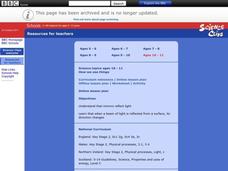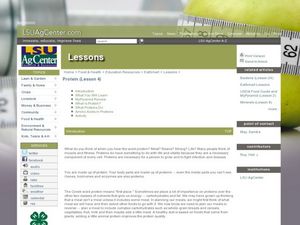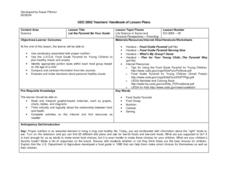Curated OER
Micro-organisms
Students examine how micro-organisms are living organisms that are often too small to be seen. They explain that micro-organisms may be beneficial or harmful.
Curated OER
Forces in Action
Students ask questions that can be investigated scientifically. They determine how to plan a fair test by changing one factor while keeping other factors the same, to use measurements to draw conclusions and use scientific knowledge to...
Curated OER
How We See Things
Students explain that mirrors reflect light. They examine how when a beam of light is reflected from a surface, its direction changes.
Curated OER
Changing Circuits
Students participate in an online lesson to explain how to make bulbs brighter or dimmer in a series circuit by changing the number or type of components.
Curated OER
March Market
Students role play a living wetland food web. They trace the food web associated with the items in their lunch.
Curated OER
Where Do You Fit In?
Students study habitats and then draw a picture of their own habitat which includes the location of food, water, and shelter, and the concept of space. then they cut their habitat in half and discuss how this would affect their lives.
Curated OER
Protein
Students examine protein, what it is and how it functions in the body. In this protein lesson students study the food pyramid, what a protein is and what it does.
Curated OER
Laws of the Jungle
Young scholars build a video game on predator-prey relationship. In this biology lesson, students identify the variables that affect this relationship. They write a short description and play each other's game.
Curated OER
Lion Quiz
In this lions quiz learning exercise, students answer a set of 12 questions about size, lifestyle, diet and characteristics of lions. An answer key is included on page 2.
Curated OER
Let the Pyramid Be Your Guide
Students chart foods on the food guide pyramid and design nutritional food plans that include all the food groups.
Curated OER
Plants Crossword
In this plants worksheet, students solve a crossword puzzle. Students have a word bank to use and are given sentences as clues.
Curated OER
Following a Recipe
Learners create a cookbook. In this recipe and writing lesson, students brainstorm the skills necessary to follow a recipe, watch a cooking show and write down a recipe used. Learners use a word processing program to write a paragraph...
Curated OER
Goal Setting
Students understand how they can incorporate dietary guidelines in their daily life. In this investigative instructional activity students set dietary goals and incorporate an activity to learn how to create a new seed variety while...
American Museum of Natural History
What Do You Know About the Human Microbiome?
Scholars answer 10 multiple choice questions to test their knowledge about the human body and microbes. Correct answers come with a rewarding tone and brief description.
Curated OER
Hunting for the Controversy
You can help students deepen their understanding of the advantages and disadvantages of hunting animals with these lessons and activities.
Curated OER
History in the Making: The Tortilla
Fourth graders examine the history of the tortilla and extend the study across the curriculum. For this history of the tortilla lesson, 4th graders research the background of the tortilla, determine the ingredients, and work with the...
Curated OER
Pyramid Play
Learners investigate the concept of the Food Pyramid. They use a game as a tool of discovery in order to classify different types of food in the pyramid. Upon completion of the game the students construct their own models of it.


















